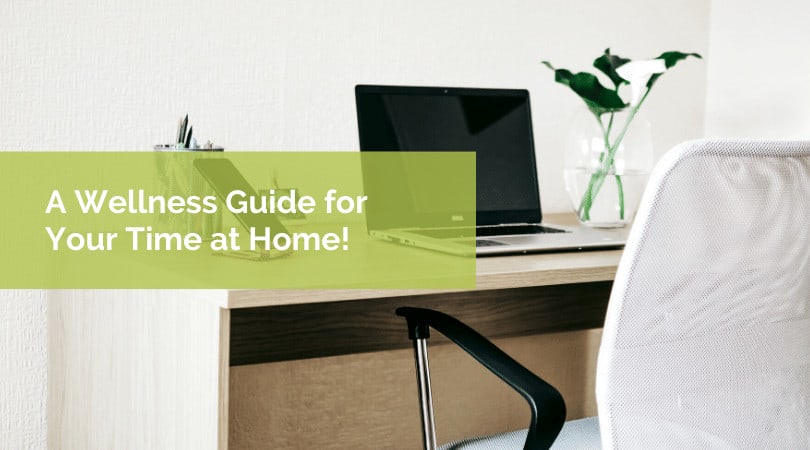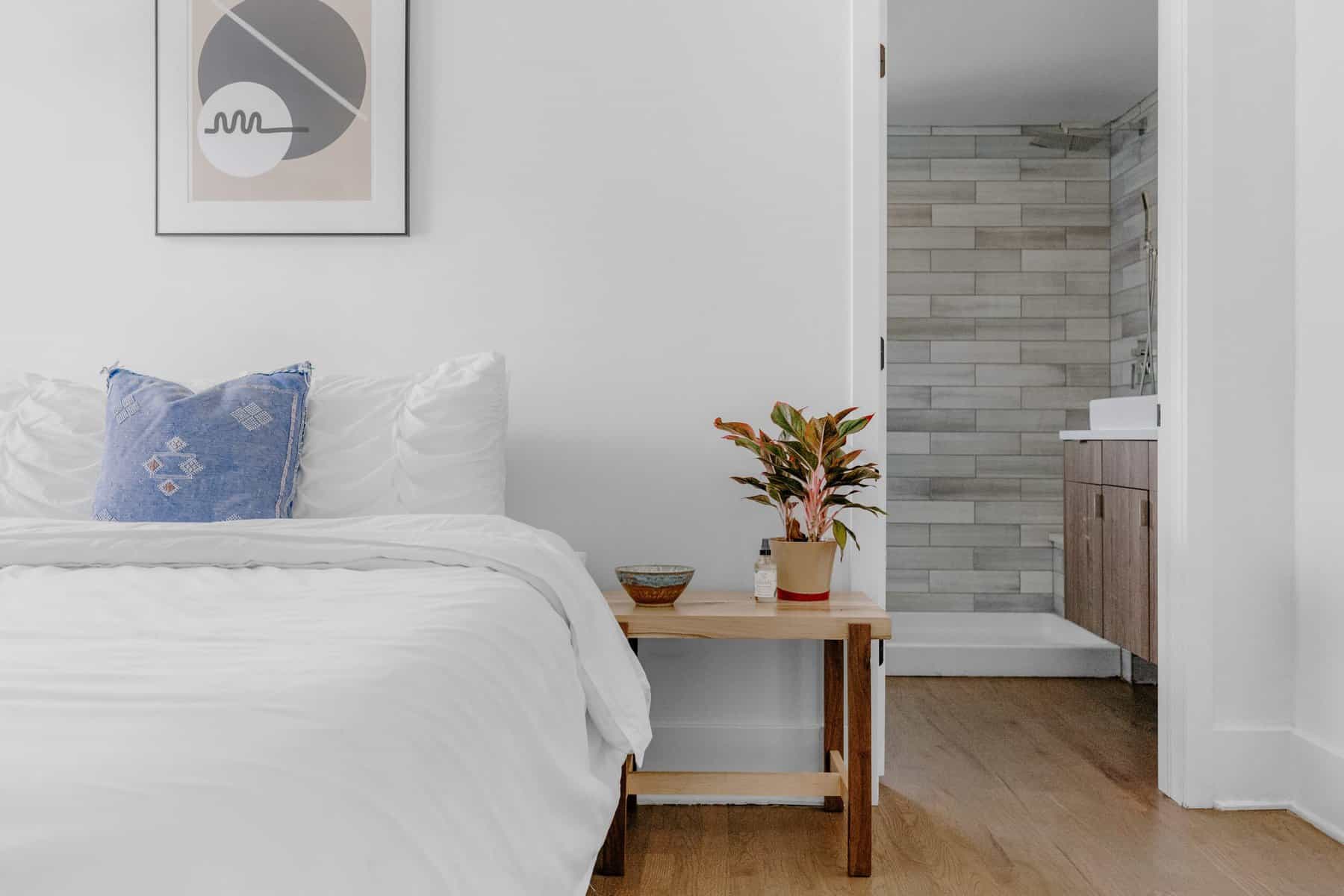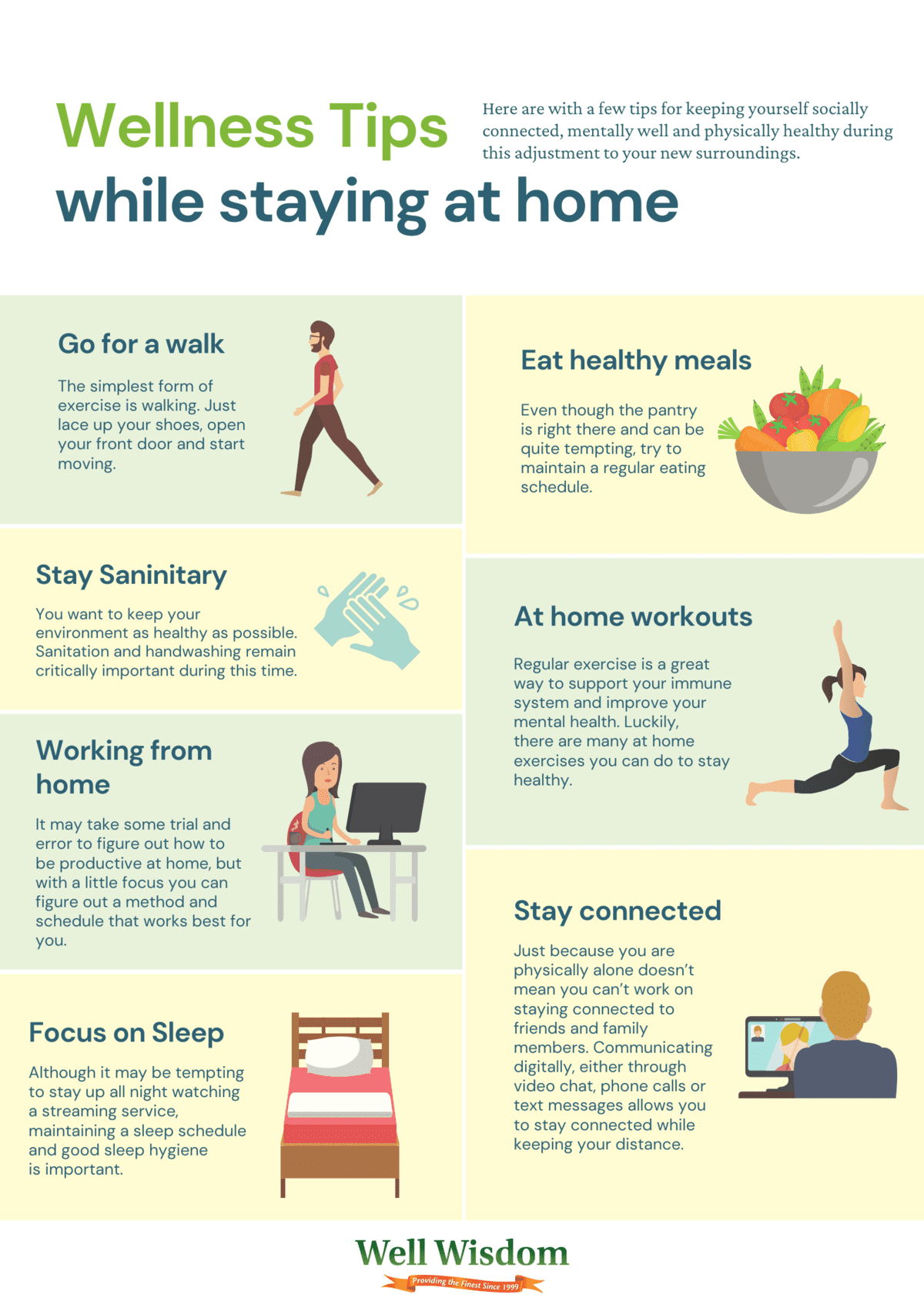full
Being at home 24-7 due to the current quarantine or shelter-at-home orders is a completely new experience for many of us. Most of us have active lives out in the community and are not used to working from home or sharing space with family members around the clock. Just the feeling of being trapped inside four walls all day can be stressful. In addition, everyone is feeling a lot of stress and anxiety with a global pandemic and significant economic changes looming outside those four walls. This is a time of unprecedented stress to say the least.
Instead of adding fuel to the fire and dwelling in negativity, we thought we would help with a few tips for keeping yourself socially connected, mentally well and physically healthy during this adjustment to your new surroundings.
Staying Connected
We all need social connection. A 2015 meta-analysis found that feelings of loneliness and lack of true connection can negatively impact your physical health as much as smoking 15 cigarettes per day. Isolation and loneliness are twice as harmful to your mental and physical health as being obese. The bottom line is that social isolation increases the risk of mortality, beyond many of the normal risk factors of poor health.
Now that the whole world has been flipped upside down, we are being asked to remain socially isolated to stay healthy. Although this social isolation is vital in the short term, it can add to the stress of an already difficult situation. Studies of previous quarantines reveal increased rates of substance abuse, anxiety, depression and other mental health problems. The people most at risk for challenges related to social isolation are the elderly and those that live alone.
Just because you are physically alone doesn’t mean you can’t work on staying connected to friends and family members. Communicating digitally, either through video chat, phone calls or text messages allows you to stay connected while keeping your distance. Keep a regular “chat date” with close friends and family so you don’t lose touch. Of course, this doesn’t replace the physical connection with others but for the time being it can help you get through the next few weeks.
If you know someone living alone, check in on them regularly. Pick up the phone and give them a call. If they are elderly, consider having a meal or groceries delivered to help them out. Anything you can do to reach out to people feeling isolated during this time can help them remain mentally well. Read our guide on staying connecting with loved ones while social distancing.
The Importance of Mental Health
Maintaining your mental health should be a number one priority during this time. There is no doubt that there is a lot to be anxious, stressed or depressed about. Yet, there is also a lot you can be doing to protect your mental health.
 The first step is to stop information overload. The media has updates about the latest statistics, newest cases and devastating news stories 24 hours a day. But, many of these stories just cause more anxiety and don’t really change anything in your day to day life.
The first step is to stop information overload. The media has updates about the latest statistics, newest cases and devastating news stories 24 hours a day. But, many of these stories just cause more anxiety and don’t really change anything in your day to day life.
Although it is important to stay generally informed of the changing situation, if the news is making you more stressed, set a daily limit for how long you are allowed to look at the latest updates. Put your phone in the other room, to resist constant scrolling. Consider only checking a reliable news source once or twice a day.
Read supportive mental health articles on sites like Psychology Today or, if applicable, seek out guidance and solace from your spiritual leaders. Look for something positive to be grateful for every day. Engage in activities that make you happy, like reading a good book or cooking a delicious meal.
If you are struggling with anxiety or depression, many mental health professionals are offering virtual sessions during this time. Psychology Today offers a listing of therapists who provide virtual or online appointments. Consider checking with your insurance provider to see if they cover virtual mental health visits. Focusing on the importance of mental health for yourself and your family should be just as important as social distancing and good hygiene during this difficult time.
How to Work from Home
Productivity is also being impacted by COVID-19 as many of us have now been forced to work from home.
For those who have never worked at home, it may be a challenge figuring out how to be productive at home. There are a lot of distractions at home that may pull you away from your work. If you have children who are out of school right now, they can make it even more difficult to stay focused.
First, understand that during this time you simply won’t be productive in the same ways as you normally would. That’s not to say you shouldn’t strive to fulfill your responsibilities but realize that breaks and self-care are equally as important as productivity.
Second, try to maintain a daily routine. Wake up at the same time every day. Shower and get dressed in real clothes. Resist the temptation to lay around in your pajamas. Take regularly scheduled breaks, just like you would do if you were at work. If you can maintain a somewhat normal schedule, this can help you be more productive.
were at work. If you can maintain a somewhat normal schedule, this can help you be more productive.
Create a bare minimum to-do list for your work every day. Put three of your most important tasks on that list. If you complete those tasks, consider yourself productive for the day. Use a focus method like the Pomodoro Technique to work in 25 minute increments, then give yourself a break. This allows you to knock out a time of focused work without getting distracted by social media, the dishes or what other household members might be doing.
It may take some trial and error to figure out how to be productive at home, but with a little focus you can figure out a method and schedule that works best for you. Creating a bit of normalcy around your work schedule will also help you with your mental and emotional health.
Optimal Health at Home
Maintaining your physical health during quarantine is also critically important. You want to support your immune system as much as possible during this time by doing what you can to focus on at home health.
Optimal health encompasses four main areas: healthy food, regular exercise, sleep and stress management. We have already discussed the stress portion of health, so let’s dive into the other three areas.
Focus on Sleep
Although it may be tempting to stay up all night watching a streaming service, maintaining a sleep schedule and good sleep hygiene is important. The National Sleep Foundation says when you don’t get enough sleep, your body makes fewer cytokines, important immune proteins that help fight infection and inflammation. Cytokines are produced and released while you sleep, so if you don’t get enough, you will put yourself at risk for lowered immunity.

Anxiety and stress can make it challenging to get the recommended 7 to 9 hours of sleep a night. This is why a regular routine is critically important. The National Sleep Foundation offers many recommendations for how to get a good night’s sleep. Here are a few suggestions:
- Stick to a schedule. Always go to bed and wake up at the same time every day. This helps your body get into a pattern and regulate its internal clock.
- Limit caffeine, especially after 12pm.
- Avoid alcohol, heavy meals or smoking before bed. These may seem like they make you sleepy or decrease anxiety, but they can actually disrupt quality sleep.
- Have a bedtime routine. About an hour before you want to go to sleep, start your routine. This may involve dimming the lights, putting away your phone, reading a good book and sipping on a cup of herbal tea.
- Avoid screens an hour before bed. The light from smartphones, laptops or television can stimulate your brain to stay awake.
- Evaluate your bedroom. You are going to spend 1/3 of your day in bed, so you want to make it as comfortable as possible. Your room should be cool, between 60 and 67 degrees. Consider blackout curtains, eye shades or a white noise machine or phone app to help reduce any stimulus that can wake you up.
- Exercise every day. Regular exercise can help you get a better night’s sleep.
If you are struggling with sleep, consider speaking to your doctor. There are many underlying health conditions that can impact sleep and your doctor can help you determine how to address those concerns.
Exercises You Can Do at Home
Regular exercise is a great way to support your immune system and improve your mental health. Luckily, there are many at home exercises you can do to stay healthy.
 The simplest form of exercise is walking. Just lace up your shoes, open your front door and start moving. Many people are now enjoying nature trails more often. Use websites like All Trails or Trail Link to find walking trails near you. Consider exploring new trails regularly to get out in nature and get a bit of exercise. Just be sure to maintain social distance while you do.
The simplest form of exercise is walking. Just lace up your shoes, open your front door and start moving. Many people are now enjoying nature trails more often. Use websites like All Trails or Trail Link to find walking trails near you. Consider exploring new trails regularly to get out in nature and get a bit of exercise. Just be sure to maintain social distance while you do.
If you are looking for a more strenuous workout, many fitness websites are offering extended free trials of exercises you can do at home. Peloton has a free 90 day trial of their fitness app, Nike Training Club Premium is free right now and Daily Burn is offering a free 60 day trial of all their workout videos. All of these websites offer trainer-led at home workouts for different fitness levels.
Since you may have more time now, aim to move your body for at least 30 minutes every day. Consider mixing it up between walking and home exercises like strength workouts and yoga to help you stay strong and flexible.
Eating Healthy
There have been a lot of jokes going around about gaining the “quarantine 15”. This is because many people find themselves reaching for comfort food to help manage stress, anxiety or boredom. First, understand that this is a natural response when the world feels out of control. Our bodies want us to prioritize nourishment as a way to sustain our well-being during a stressful time.
 But, at the end of all of this, you probably still want your pants to fit. To some extent, you will have to fight the urge to regularly dive into a box of cookies while sitting on the couch. Not to mention, ultra-processed foods like cookies or chips are low in vitamins and minerals your body needs to fight off viruses and bacteria.
But, at the end of all of this, you probably still want your pants to fit. To some extent, you will have to fight the urge to regularly dive into a box of cookies while sitting on the couch. Not to mention, ultra-processed foods like cookies or chips are low in vitamins and minerals your body needs to fight off viruses and bacteria.
Luckily, there are a lot of ways to eat healthier right now. Most of us are probably not eating out as often, which saves calories. You also can’t easily head to the store to pick up whatever you might be craving. All of this gives us an opportunity to stock up on healthy food and create a nutritious meal plan for ourselves.
The first thing you can do is carefully plan out your weekly meals and snacks. Plan meals that contain a healthy source of protein, a vegetable (frozen or canned is fine) and a whole grain. Make a list and head to the store or use one of the many grocery delivery programs to make sure you have everything you need on hand.
Even though the pantry is right there and can be quite tempting, try to maintain a regular eating schedule. Start your day with a high protein breakfast to reduce cravings and keep you full throughout the day. Make yourself a healthy lunch and dinner that includes plenty of vegetables. Try to snack on fruit, nuts or yogurt to keep you satisfied and well nourished. And above all be sure to stay hydrated to keep your mind and body functioning at its best.
Don’t beat yourself up if you do eat your emotions a bit. Food can be fun and comforting during this difficult time. Allow yourself a few treats. Order take out from a favorite restaurant from time to time to give yourself a break from cooking and support a local business.
The bottom line is awareness around what and how much you are eating can help you keep off that “quarantine 15”. Read our full guide on eating healthy while stuck at home.
At Home Health
Finally, you want to keep your environment as healthy as possible. Sanitation and handwashing remain critically important during this time. Wash your hands whenever you return home from essential errands. Consider wiping down the inside of your car and door handles once you return. Make sure you have adequate supplies and medications in case you do get sick.
The whole world is feeling the stress from this global pandemic. Do what you can to prioritize your own well-being by focusing on your mental and physical health. If you stay home and stay healthy yourself, you can help everyone recover faster from this challenging time.
And from all of us here at Well Wisdom, know that we are in this together and we hope you and those closest to you stay safe and healthy

References
- Holt-Lunstad J, Smith TB, Baker M, Harris T, Stephenson D. Loneliness and social isolation as risk factors for mortality: a meta-analytic review. Perspect Psychol Sci. 2015;10(2):227-237.2. Thompson H, Dance A, de Jesus EG, et al. How social distancing may affect mental health | Science News. Science News. https://www.sciencenews.org/article/coronavirus-covid-19-social-distancing-psychological-fallout. Published March 29, 2020. Accessed April 1, 2020.
- Persistent Tiredness and Chronic Fatigue: Causes and Symptoms - February 27, 2024
- Can A Protein Shake Replace A Breakfast Meal? - March 2, 2023
- Glutamine After Surgery: Does It Help With Recovery? - February 17, 2023






so amazing and nice.